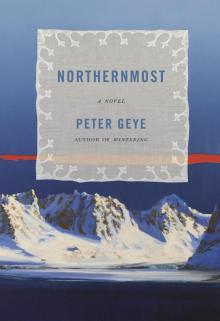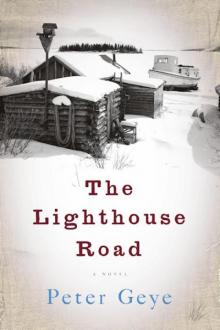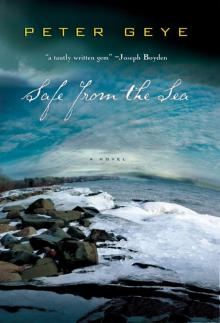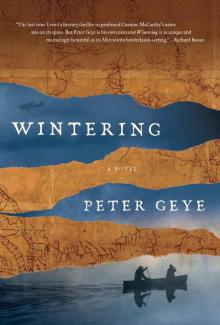- Home
- Peter Geye
Safe from the Sea Page 2
Safe from the Sea Read online
Page 2
Back outside, he resumed his spot at the breakwater. He heard the Erindring before he saw it. The ship blasted its horn, giving notice to the bridge-keeper. One long blow, like a cello’s moan, followed by two short blows was responded to in kind. The warning arms dropped on either side of the bridge, and it rose. A couple minutes later and the freighter was in full view, pushing through the pewter lake fog and faint harbor lights. It moved slowly, almost imperceptibly, and Noah marveled—as he had maybe a thousand times before—at the original notion of a million pounds of floating steel.
A faint hum accompanied the steaming ship under the bridge as it eased its way through the channel, past Noah, who had walked out to the end of the breakwater. The muted drone and eerie slapping of water against the hull accentuated a silence that seemed to grow as the ship inched its way nearer the end of the pier. When the first quarter of the bow passed, it was quiet enough that he could hear two men standing on the pilothouse deck, speaking a language he didn’t recognize. One of the men tossed his cigarette into the lake and nodded at Noah. In another few seconds the stern was even with the end of the breakwater and the hum replaced by water gurgling up from the prop. For five minutes Noah watched the ship until it disappeared into the eventide.
NOAH STOOD AT the breakwater thinking of Natalie long after the Erindring had passed into the darkness. After he had hung up with his father the day before, he sat on the edge of the bed in dumb disbelief. He heard his wife come into the bedroom, and when he looked up she was leaning against the door frame in the oversized Dartmouth sweatshirt she wore around the house.
“Who was that?” she asked.
“My father.”
She stepped fully into the bedroom and stood before Noah. “What’s wrong?”
“He’s sick.” Noah looked back down. “I told him I’d come home.”
“Are you sure that’s a good idea?”
“No.” He stood and put the phone back in the bedside cradle. “It’s probably not a very good idea. But why would he call? I have to go, don’t I?”
“Noah, you haven’t seen him since our wedding.” There was a tone of incrimination in her voice.
“He’s old, Nat, and this sounded serious.”
“If you think you should go, then I guess you will.” With those cryptic words she walked down to the basement for her treadmill workout. Noah was too stunned—both by Natalie’s reaction and his conversation with his father—to follow her.
Later, as Noah packed, Natalie lay in bed with her laptop open and files spread around her. She hadn’t said much all night, and the weight of her silence was troubling. “Want to tell me what’s on your mind?” he said.
She clapped her laptop shut and gathered her files. The look she gave him could have cut glass. “You don’t know.”
“Don’t know what?”
“There are other things now, Noah.”
He looked at her, confused.
“Never mind,” she said, leaning over to turn out her lamp. “If your father’s ill, you should go. I hope it’s not serious.”
“Tell me what’s going on.”
“It’s nothing. Forget it.”
“Hey,” he persisted, going around to her side of the bed, “why aren’t you talking to me?”
“I said it’s nothing,” she said and pulled the covers over her head.
Noah knew her dismissals to be final, so he let her go to sleep. It was only later, while he lay in bed himself, unable to sleep, that he understood her chagrin: It was time to try to get pregnant again.
Natalie was a woman wholly given to her convictions. Because just about everything in her life had gone according to plan—by virtue of some good luck but more hard work—their inability to have a child had become, for her, less a thing to puzzle over than proof that she had exhausted all her good fortune. Her fatalism drove Noah crazy, and he had recently become apathetic about their travails. Though he resented their childlessness, he simply did not see it as a reason to cease with the rest of his life. Oftentimes, it seemed, she did.
He tossed and turned, weighing his father’s phone call and all that it portended against his wife’s sorrow. He thought of waking her, of telling her that he understood why she was so sad but that he had to brave this homecoming. He thought of taking her in his arms, hoping his embrace would prove his devotion.
But he didn’t wake or embrace her. He lay awake nearly all night, falling asleep only after the first hints of light had filtered into the bedroom. When he woke a couple of hours later she had already left for work.
NOW HE WALKED back to his car and drove up Superior Street to the Olde Hotel, where he checked into a lakeview room. Natalie had never visited Duluth, and he was glad of her absence now. It seemed not only right to be alone but a relief.
He dropped his bag on the settee and walked over to the window and spread the curtains. He knew he should call her. She would expect a call.
He called Ed instead. Three years ago Noah had quit teaching history at a Brookline prep school and bought an antiquarian map business he’d seen advertised in the back of Harper’s. His single employee was a retired marine colonel. Ed was dependable to a fault and was looking after the store while Noah was away. Over the phone he reassured Noah that he needn’t worry, said he’d call if he had questions, and told Noah firmly to go take care of his ailing father.
Outside, the rain had stiffened and was washing away the fog. Noah kept his eyes on the lake while he dialed home.
“Hey,” he said, “it’s me.”
“It’s you,” she said, the sound of her voice taut with disappointment.
“I’m in Duluth. I got here about three hours ago, too late to drive up to Misquah. I hope I didn’t wake you.”
“You didn’t.”
“I got a hotel room. I’ll drive up there in the morning.”
He noticed a light gathering form out on the lake.
“Okay,” she said. “How are you?”
“I’m fine. Listen, Nat, I’m sorry about how I left.”
“It’s not how you left, Noah. It’s that you left.” She took a deep breath. “But I think you know that.”
It was his turn to take a deep breath. What could he say to appease her? “I said I was sorry.”
“There’s no need to apologize.” He heard the refrigerator crunching out ice, her glass of water before bed.
“I didn’t plan this, Nat.”
“You haven’t seen your father in more than five years, Noah. You’ve hardly talked to him.”
Noah thought of the pictures in the museum. He thought of his father’s distant voice on the phone just yesterday. “He’s sick.”
“I know.” The strain in her voice lessened. “The timing is terrible, that’s all. It’s incredible.”
“You’re right about that,” he said.
Noah watched the rain strengthen, saw sheet lightning up over Minnesota Point. He knew that the root of her terseness lay in her overwhelming sadness, one that consumed her often. He feared that his coming here was unforgivable as far as she was concerned, but he also knew that when he’d told his father he was coming, he’d had about as much sway over his own words as he now had over the thunderstorm outside.
“Just call me again after you get there. It’s late and I have an early morning,” she finally said.
“I’ll call tomorrow.”
“I have an appointment with Dr. Baker tomorrow, in case you forgot.”
“I didn’t forget, Nat.”
A meaningful silence passed, as though both had more to say but neither could articulate their thoughts. Finally Noah said, “Good-night, then. I love you.”
Natalie said, “Good-night.”
Noah remained at the window. When finally the rain let up the light he’d been watching out on the lake came into focus. A freighter, her deck lights radiant with caution, lay at anchor. It was a fitting view for his faraway feelings.
NOAH THOUGHT OF the map of the north shore he had framed a
bove his desk at home, a lithograph of the Minnesota arrowhead circa 1874. There were no roads then—either on the map or in reality—but the Lake Superior shore was dotted with towns, most of them now gone or renamed. Whenever he found himself sitting back in his desk chair, looking up at the map, he was reminded of passing along this shore as a child.
Highway 61 was as forlorn in those predawn hours as it had remained in his memory. The potholes and seasons-old frost heaves yet pocked the blacktop, the dilapidated wooden storefronts and signs warning of deer crossings and dangerous curves still marked the road-side, the countless rivers and streams rushed under the highway bridges as they had for ages. But the two deadliest curves—curves that had once pinned cars on sheer cliff tops—had been replaced with quarter-mile tunnels burrowed through the bedrock.
He had left Duluth an hour ago, sleep starved and anxious, and now was toying with the radio. A disc jockey from a station in Marquette announced the time, seven twenty-five, and an old country-music song. The first few chords of a steel guitar moaned before fading to static. He turned the radio off and settled into the hum of the tires on the pavement. Occasionally the road curved to the right and the trees dispersed and the brown rocks and the brown water of the lake came into view. The lake was unusually still, especially in contrast to his memories of it tonguing up onto the stone beaches. They were a child’s memory, though, the water all froth and fury.
Just clear of Taconite Harbor and the Two Islands he saw the sun rise over the water, remembering the adage about a red sky in morning. It was red—the sky over the lake—and lowering. It reminded him of the late-season gales that had been the curse of his mother, the curse of all the ore men’s wives. He never knew what to think about the storms but that they were spectacular. There was one stewing in the distance.
He passed the Temperance River and pulled the directions from his shirt pocket. His father had called just two days ago, his voice hoarse and whispery.
“Hello, boy,” he said, the heavy pause between words freighted with circumspection. Without waiting for Noah to respond, Olaf continued, “I may need a bit of help getting the place ready for winter.”
“Help?” Noah said. Help? he thought. He almost said, Who is this?
“The woodpiles, some work around the house.”
“Why?”
His father took a deep and raspy breath. “I’m sick, Noah.”
It wasn’t what his father said as much as it was the fact of hearing him speak at all that alarmed Noah. The silence between them had become unconditional. Noah couldn’t have said whether the estrangement—from his point of view—had evolved into forgetting or forsaking, but when he said to his father, “I’ll come, I can leave tomorrow,” he was alarmed again, this time by his own impulse. “I’ll fly into Duluth. But I’m not sure I remember how to get to the cabin.” Now, approaching Misquah, he began to feel uneasy. He’d traveled this road a thousand times, but not since he was in high school.
The directions Olaf gave were those of a man who knew where he was and where he was going unconsciously: Up in Misquah you’ll see the Landing there—it’s got a red sign. You’ll recognize it. Past the Landing the county road goes into the hills. You’ll see a stand of firs burnt red from this summer—it was a warm summer—look for those trees. Twenty minutes into the hills you’ll come on Lake Forsone Road. There’s clover still flaming in the ditch on the right. When I first saw it, I thought it was a goddamn brushfire. Turn and follow the road around the lake. You’ll remember when you get here. Anyway, it’s simple now that I think about it: Just keep the red on the right, like the harbor buoys—red, right, returning.
Among the red markers his father had mentioned, only the gas station was plain to see. He spotted no stand of red-burnt firs, no flaming clover. The county road was tucked behind a rock outcropping at a bend on the highway. He’d been expecting gravel, but it was paved now. The trees his father had mentioned were barely distinct in the forest of millions. The burnt red his father had described was an almost indiscernible rouge they wore among their green, green boughs. The road ascended quickly and narrowed into the deep timber.
Ten minutes later it veered sharply to the left and in the middle of the curve, on the right, a dirt road tunneled into the trees. At the wooden marker Noah stopped to watch a whitetail deer and her fawn breakfasting on the tall grass. They were so lithe and alert. Noah moved ahead slowly, taking a last look out the passenger-side window. There in the grass he saw a patch of red clover.
Despite his father’s suggestion that it would all look familiar, Noah had no memory of where the house might be. He followed the road left, to the north, past the public access and over a culvert. The road continued to curve away from the lake, so it surprised him when he saw a mailbox, barely attached to a rotted post, with his father’s name faded to the edge of invisibility. He stopped again, opened the mailbox, and found mail postmarked as long as three weeks ago: supermarket flyers, real estate offerings, magazines, and a handful of envelopes from the Superior Steel Company. He took it all with him.
Noah turned onto the trail. Long grass grew between the tire tracks, and overgrown trees brushed the top of his car. For a quarter mile he crept toward the lake under the shade of the trees. Then the road widened and began to go downhill. Rain runoff channels a foot deep grooved the hill, and what little gravel remained on the trail was unpacked. After three sharp turns, the cabin appeared before him.
He parked beside the rusted Suburban that his father had bought the year Noah went to college. Noah’s Grandpa Torr had been a meticulous man and had kept the house shipshape. The woodpiles—like bunkers along two sides of the house and in the middle of the yard—had always been expertly stacked. His grandpa used to boast that they could withstand a tornado. He kept the trees trimmed, too, and the small lawn mowed. His Grandpa Torr’s fastidiousness was redoubled in Noah’s own father, so the disrepair of the house shocked Noah. The rough-sawn cedar siding had taken on a green-gray hue, and the grainy, knotted siding had been weathered smooth. The roof bowed and had bunches of moss and spry grass growing between the shingles. Either his father had become a different man or he’d not been well enough to maintain the place for years.
Not knowing whether to knock or just walk in, Noah hesitated before pushing the screen door open and stepping into the house. “Dad?” he said. “Dad,” he called again, waiting for his eyes to adjust to the dim light. No one answered. After looking in each of the two bedrooms he stepped back out and walked to the shed at the edge of the yard. With its fieldstone foundation sinking into the earth, cracked windows, and peeling paint, the shed looked as bad as the house. A padlock secured the door, and curtains covered the windows inside. He turned, stood for a minute watching the privy up the trail, and when his father didn’t appear, he started toward the lake.
As he walked down the footworn path he recalled countless days when as a child he’d followed his father up this same trail. He could picture his father’s broad shoulders, the stringer of lake trout hanging from his thumb, the purposeful stride. Noah could never keep up with him and was always out of breath when he reached the top of the hill. There he’d find his father standing over a tree stump on the edge of the yard, his fillet knife ready. Noah would pause every time, watching from a short distance the man he hoped someday to become. Those memories were coming back to him sadly now, and as he neared the shore he stopped suddenly.
Was that man really his father? He had a rod in the water, fishing in the shallows alongshore. His spine was bowed and knobby. His stark white hair framed his head. He cut a lonely silhouette against the lake, so lonely in fact that the steely resolve Noah expected of himself gave immediately over to sadness. Noah stood there for a moment, then coughed and said, “Hello, Dad.” He took a step in his father’s direction.
Olaf turned and looked up. “Ah, he’s here.”
Olaf reeled in his line and set the rod in the bottom of the boat. The rusted and bent dock poles evidenced the many
winters it must have spent in the water. The missing planks were more confirmation of the sad state of the place. The dock swayed with his father’s clumsy steps as he came ashore.
Olaf stood before him for a long moment. He had become so slight that Noah was able to look squarely into his eyes. Finally Olaf said, “How was the trip?”
“Okay. Fine.”
“All right.”
“How are they biting?” Noah pointed at the fishing rod.
Olaf turned to the lake. “There’s fish out there, just none for me. You eat breakfast?”
“Not yet.”
“I’ve got some oatmeal.”
“I’d eat oatmeal.”
Olaf looked up the hill, took a deep breath, and combed his beard with his hand.
“How are you feeling?” Noah said.
Olaf looked at him as though he were surprised by the question. “Like a hundred goddamn bucks.”
“That’s good.”
And Olaf started up the hill.
Noah trailed him, watching his father’s slumped shoulders, listening to his heavy breathing. The old man could barely lift his feet. When they stopped midway and Olaf rested against a boulder Noah said, “You sure you’re okay?”
“It’s a long goddamn walk nowadays,” Olaf said and then started up again.
When they reached the top of the hill Olaf leaned on the corner of the house. His flannel shirt hung on him like a drape, his pants sagged. The deep wrinkles around his eyes lent them a hollow aspect and accentuated the look of fatigue on his face.
“I can make breakfast,” Noah offered.
Olaf stood up. “Come on inside,” he said.
Olaf put a kettle of water on the potbellied stove, which stood along the wall between the two bedroom doors. He stoked the fire and walked back to the kitchen. The box of steel-cut oats sat on a shelf over the sink. Olaf filled two bowls and placed a spoon in each.

 Northernmost
Northernmost The Lighthouse Road
The Lighthouse Road Safe from the Sea
Safe from the Sea Wintering
Wintering